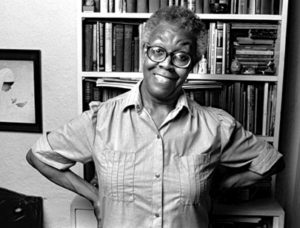A Surprised Queenhood in the New Black Sun: The Life and Legacy of Gwendolyn Brooks
By Taylor Jasmine | On August 23, 2017 | Updated November 18, 2022 | Comments (0)

June 2017 marked the 100th anniversary of legendary poet Gwendolyn Brooks. In commemoration, Beacon Press has published A Surprised Queenhood in the New Black Sun: The Life and Legacy of Gwendolyn Brooks by award-winning poet, playwright, and novelist Angela Jackson.
The first trade biography Brooks in over two decades, the book offers a fresh account of this literary icon.
Granted unprecedented access to Brooks’s family, personal papers, and writing, Jackson provides a new retrospective on the first African-American ever to receive a Pulitzer prize.
Jackson traces Brooks’s early childhood growing up in Brownsville, an African American neighborhood in Chicago, and its influences on her writing. Brooks’s parents supported her literary endeavors from an early age with her mother telling her she was “destined to be the lady Paul Lawrence Dunbar.”
Her first poem was published at the age of 13, and within four years, she would have 75 poems published in the Chicago Defender. These early poems, checks and notes, celebrated the beauty of being Black, and reflected on her struggles with intra-racial colorism.
In time she would be mentored by both Langston Hughes and Richard Wright. According to Jackson, Brooks blossomed as a young woman after joining the NAACP Youth Council, where she actively participated in protests against the lynching of the Scottsboro boys.
. . . . . . . . . .
An excerpt from A Surprised Queenhood in the New Black Sun:
Gwendolyn Brooks: The Poet as Working Mother
. . . . . . . . . .
Brooks’s first collection of poetry, A Street in Bronzeville, published in 1945, is essentially a love affair with Black Chicago, writes Jackson. Her second book, Annie Allen, focused on the life and experiences of a young Black girl as she crew into womanhood in Chicago.
Exploring themes of racism, colorism, classism, and sexism, Brooks was very much grounded in the reality of her life as a Negro woman, Jackson writes. In 1950 after she won national recognition with the Pulitzer Prize for Annie Allen, she still had to depend on odd writing jobs and freelance book reviews to help support her family.
Throughout the book, Jackson examines forty-three of Brooks’s poems for style and context, including “We Real Cool,” “To Those of My Sisters Who Kept Their Naturals,” “The Bean Eaters”, “Life of Lincoln West,” “Primer for Blacks,” and more.
Her work, Jackson shows, touches on issues of self love and self acceptance, marriage and motherhood, and the untimely deaths of Emmett Till, Malcolm X, and Medgar Evers.
. . . . . . . . . .

. . . . . . . . . .
Jackson ends the book with a series of remembrances of Brooks from other writers, including her own encounters with the poet. “She was Ms. Brooks to me. There was a hush in my voice when I said it, for I knew she was a great poet,” she writes, “I felt her presence, delighted in wonder before her words.”
. . . . . . . . . .
The text above from A Surprised Queenhood in the New Black Sun (2017) was provided by Beacon Press, reprinted with permission.
Angela Jackson is an award-winning poet, playwright, and novelist. She is the author of numerous collections of poetry, including the National Book Award-nominated And All These Roads be Luminous: Poems Selected and New. Her novel Where I Must Go won the American book award in 2009. Roads, Where There Are No Roads was published in 2017. Jackson lives in Chicago.

Leave a Reply